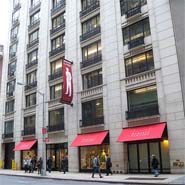Affluent consumers reported rising and falling levels of optimism throughout 2012 and that uncertainty is continuing into the fourth quarter. Therefore, luxury spending will likely remain neutral during the holidays, according to the October Mendelsohn Affluent Barometer.
This consumer group is reporting high feelings of optimism about their employers, while at the same time they are uncertain about the economy and recent events. Also, the report uncovered that the luxury market will not see notable growth in spending by ultra-affluent consumers this holiday season.
“This data really reflects more than anything this uncertainty about the economy as it was exacerbated with the election and other events,” said Stephen Kraus, senior vice president and chief insights officer of the Audience Measurement Group at Ipsos MediaCT, San Francisco.
“Optimism throughout this whole year has been volatile,” he said. “I would say this reflects the uncertainty about the economy as a whole.
“This was conducted before the election, so affluent consumers were unsure of that and the effects of Hurricane Sandy.”
The October 2012 Mendelsohn Affluent Barometer was conducted online Oct. 22-31. Respondents included 917 adults with a household income of at least $100,000 who were included in the “affluent” category.
The sample also included 167 adults with a household income of at least $250,000 who were included in the “ultra affluent” category. The data was weighed to reflect U.S. Census data.
Trouble in Washington
Thirty-four percent of affluent consumers respondents were optimistic about the economy during the time period studied while 43 percent reported being pessimistic about the economy, per the research.
Both the economy and federal debt were main areas of concern for affluent consumers during this time period.
The presidential election and Hurricane Sandy added to affluent consumers’ uncertainty about the future
“We definitely see that whether it is an election or economic uncertainty, affluent consumers have a tremendous frustration with what is going on in Washington right now,” Mr. Kraus said.
Affluent consumers also reported levels of high optimism around the time when congress made a bi-partisan effort to extend the Bush-era tax cuts.
“What drove optimism to such a high in that month was that the president and congress agreed on something,” Mr. Kraus said. “It was not about the tax break.”
However, there are areas where affluent consumers are showing optimism now.
Currently, 70 percent of affluent consumers report being optimistic about their employer.
This is a 12-month high for this area and the number of affluent consumers who are optimistic about their employer continues to be rising, according to the data.
Holiday spending
This quarter, luxury spending by ultra-affluent consumers is not growing as much as it has in the previous months.
Thirty-five percent of affluent consumers and 43 percent of ultra-affluent consumers are planning on spending more than $1,000 this holiday season. Many are expecting to reduce their holiday spend compared to last year.

Holiday lights on Rodeo Drive
The neutral luxury spend among ultra-affluent consumers is surprising since this demographic was the driver of the luxury rebound a few years ago, per Mr. Kraus.
“If you look at the last couple of years, luxury spending has been concentrated in the very high-end consumers,” Mr. Kraus said.
“I think the broader trend in luxury over the past few years has been leading to bringing in a smaller, more-affluent target customer base,” he said.
“Now we view the ultra-affluent consumers - the top 2-3 percent of the country - as the core luxury target.”
Final take
Erin Shea, editorial assistant on Luxury Daily, New York
{"ct":"2gZ1NkZuB8y3a9G9DP\/1Vz2KDbrFc+BjY40WazYmiESYqYUxyC1+1JT85cwX4X7B0LauRbLFNLIRBOP37MfIzhjiJCzWYm58xs2JW7sIRfSybBOps7eLuTgJoKGzq\/JtoX18OKaaFTbUgl1ZQz8PeERduzNLpvCqp7GGUA9oteTwGu24I\/50u0\/RHebUjfjXUEAt5lELanidx20AMYbWX8tANOT26Q2cGXlhutthusZYc\/UdEks5B10cfh0QZ2GZmLeG+K6dnBO3zYu2lK9AMa8Ji5QP9zzp1dkGpLNdN+s\/CUTxJORDa+a4v\/Ax2iMFuNcRaDzdjpZcqG1WON6eFh5U9xle6lQFz9HzMYiAGVZ1Mui0Iadh0DXJzFSQdnqI\/nqb3RAU28Lima8YV\/3MPuZYZCqujZQXXT4gIKtV7mfdzeoVs\/+TRszzCrrtPLwUbGvU4i4yzc3SFFAdBC+ERb8JLadNRdtB\/egtrEHMEWrf6O1q7ZQWXbIFh\/W1kLU0dDZ4ALEh0kqUcubl\/oVqrXu209ZOFFs8w7ytd2PRYq4kaKiWlmZgIbbeev7nLSg9TsRsFgVSK05W7iXZKaqVA0qWzSL1ctIlPabSzU9TsgUfX7FtcPA2moYW5PJYrrw4k71zYAdphojlobQ3CG4zAf9RXWyRKd\/mufke15jUlywoIL+A0OmFRLbB8ntafuN8Ss7tvhTQ42JPcaNf7t0KvW4aTVGglFsNxm\/zg+WT32Ucqs8usYPuE82k5xu1YhXgkBHHlFTTWhyo2Ol8AO3GnW0zlYkBr7+nT8lw0NpH8qHEOhVSN8SpnZFL4oEO47dVej7zkZqUt2rDAnAJBfZXrWDXsdWR1paa\/TrJ63QnqT\/5Ebmc9cWacdwhl9vbQyp38DunAlCygTYRDe8wtoIn38X5YjzxFkhkp14dccgfFqyBWp4L5Ldldi\/mSd2NGNIroSpk+P3ejwzNl3teT4CyKrVKxsLr9nbERPw1wUdhaSx1NauCNpYbQJbvimKyDVc7tsER8F+hvpDkF11RKkaQim4KTiYjBxUPGuPIWqybo5PbxdADmudFcqB6db\/MG2Swkf7T1w6OpQlP4H0ekejUO0KhWpeGTURo3p3R2wZqU+HwVnPOC2WqTvJ4AUIESq40h\/bkGhJMqoX5TbWk0+pkYpQrC7ulV1rMe+BGC+E8r\/K1lNixCarCxnsbV4JGKwI3KwR0jjvfZJRrv5Jj0qDj9LLmSNlS6zwAnCm+wmcm+BK2YRO0srO2zsHPFmoSyAW8bIwsp5i9vilcmXrDS+v83jpEV46ps8Rqq7e\/s3yyemMYnAepeKjatk0vQzo2uIU8+\/xF8OkbldN+ow\/D5EUIqJAiYiUsgit3KN\/jz6W6B+0ZxcU1nc+SAX3Xx6dqp5TxlwVfnLIH\/dvG82xmCLS9gDCfUCI\/d2ags6+jhvD5OssQ8IvQ5nDBYqeIHFgZvHO1CuAVbMDwiU3phpGP6R\/xZPRKSgdM4r8dk2+UTg1EN8u2EPJL0cKAZoaha9PrJbTQejuSr6eFJr8Lu8nNYEEYOHnE30WzMEit0hbK2dZiRdHmmMHpqy6HK2RYUUxGrVnBB0GB6ztcR9tAxX9ya+ArSrFiLhQXqlyTQ\/JpRm2IZbZBncX3TuSrkz9HWmORiSP7alIHz+dY+NWliAuI3yaq9WMkT29f5hzHVQiM7nHEkgOQcandQ7sw+5fx9Lx1zcobWEa\/P5q3BSFzElFgKbuhlSJDurIeGQGS9KqZZ9kx6TRdvZdNvn1MyA2OfewD05gvGKgIkdG4vsovoMqsgJ9MKNoNTsgcKkSXyg4TJbM+Ki0lS7bJRxkepQhvUAbz9YfF0OVTcU+AiTmJqyGVFil0OPK86Py22nYYNcHSAAFP2MswHiyHKVCOPyhF7gwYoVJGmhy7Y6iikxhO3sDUhD5ts0vv5GSGt43V7VUMlxaPDXQQju0waoX9uLATE4l9RZaC+eBDzXxo1dQ3XJBHcsG6nxe\/XTkIcvZs1CO\/G7\/NjoPuWn+jlu8IIR7TupvrF1TzI6TmStGN\/R\/ANEUNaLRy1CFPF4O7IzdcmWygxHGYJXw4XwCCakwxp1XLZIx1k+u\/4boyz98GMKkI1XHrPksdq8AJJBEH0aiwKEcOvA3WYUcuai6N6Qz2cvaAHARy1vCFTmbUzHrLt94BmOJ+PGBMSJKQ1\/y91VOiAIEWGL0vEGln2cLFsvSR5ane1GVWL62b\/zqg40VZpxOQQV+TMMMUHMM\/+tFWYNMnD2L3FSGkKzFWsDILGLUz8T1Rnks4IfzUQAtu6pu3ei9lWGEHCFau3fLKB7Lzn8WZ7c2NbHCwoDBQEjYQ41dln646+pKt4oqChPOEUxBvo6rD70ggyRIEJX5e0rfAHjh7iTdmKbfIyYwgIMNaAv1xKsovPpM7zt20ZlAMkUfKoWMA3kRIIXL78qf3jwvSojKl2j41eZe9xATMx9T9B\/OP+jCNZ3Ze6Jf7Ue9BDH1hlfOesEIcd2HWT3EYVEbWNeWScBUQclhMmq+aOfZgCiewWo8ZaZqKelMzQCsxJHpZyFyE+ymtX+78LXIlMVaueu6CYX\/SImIaDmMttwBkHmdyWZrTbSP10KiBvlp94XjVTWstG3wGdhSF9OdUbb3mlJO6tNIaO81+oxfupKZN2tda2Dtz+KT91ONpKqmAFtiJvDkJrqxyZXj2Olcizw6PVbMuFLUTCplVMiggIVIiWglRbfxBHVmIR+hNv2sEAd5M45wFIY87EChiF3BLQhmpSzaU\/oImyQlrpodtiAvqsqBoqDBDp9v1SqV3ck99aSb7Wc8rovEkMkwJd2Wuby3e7U6cqmYsOJ5W5OLJ4B5ly4tMOXmb2JnrWnJ3JmlfsMQckRxjP+3NzGpE2eLMMZfeJ6b4u6DnWtPcn04TE1\/IAYawIAADkttWon6OLFprr0I6MR7l8z7k6j4Z\/Ow65uKn2azMktcUMN3jXsKFmADuoIfZ8nVKXSYMtWB8YDoN\/aiqG3j2H6jy7joTgbTefRmYNBI1o0T09syuwmeLwJuuWwWqUywHZAaZuH3NXA0b1D9skUOTkkHvGqGzzkZn1D1UUkOxsgnxHakR2gEITvO1CsCFEy5d54Y6x991nzESVU\/xFI2R3VrW8CWw+yfrU0k+4JANtVR3FsD2JZInb+Z5O+Ct6BKZ6\/kgiNvV+N+dG3\/URROmfg\/9x7EpfFDsCqt3Ui0n2ImCIbdJllrziGLCSYWxs4q5aPamiS+G5F\/0d36IKgbREyoT6lD112rJE3s5Fx6EuDMhc5BOAENSmI+HSIV2IObKzVtmm68ri5fB2WmhmrOQPwKSvrsZFIgBre6mbpEK7bb2O+47qt2k71d8oG2FVFYdkUnDIc9rHkUo6Es2zFEl0kAaM0c\/UTC2qqMfuvhIeLVNirlEVyuXMh9V5mgk433O6DkgB119R8LVRQCUTjJ7UuYM+OPfg\/o\/sZOBKYoX+2GaPWMF89oF06ZDW3YqFIW4\/7EKgftryVO84Cx4wXTm6Zh6m+5cPCNvKs4TO\/Idb9OV8GJI11tfItXtt+n2WgAXdEU56lEHiGAs7jusC3YmonpevpYBvRd4PxWQYlk33JW9nHWYSsvIio3rGYmoca\/Ncy95e5MmyodcbYuJhq2ote2Cn8knOH4cbIUgiSAM7a1MWmS1dU4PT1NOzOTxXtNA5CBvRVii0KPEO4b5winNi75psl8BXp7\/vg5fW06DyTEvoX+J4LrbxTHfrTHmeiE9wrQdJoLvhjYs0gBDK\/voamxsOy7sAHdgI47VpAYOg2Xlq2hZNOiuw042tD05jQYgoyhLWN9H30YUt+svUO7skO+Nu2qYBF3teNT9DAu9Jd85K0zgNv\/3EB+V3Y5gEOPMI5B1KWlAOvvnQbgCtt7SHf7i46lytNxli2mlVkq0dwTNcLCuBhvhqP7l9FN9EEjJlUhyHQBe8Q64wr4ODt+SebzzJapMG5VrqRhw+dQk3YDUh6TzWfPTR8P8kiFazoWyulzeAyHQ0z+DKcPywB1e46P3A48VtLYoDgE4IKvM\/TZCFzmAesAuZQ1ndNigm+22OxSNImF67u4l23\/EDDn5meyOnlE7hgz\/oezr5+v8X3f\/jRe7cTNHW5MSLcUfiQLNWTawJBxxUghjMUkAppN0du4iM+0S5OpQe6l\/Cz4S5ePN8szteXJhaPIN3L9PgqPt2ZqHwUKiSSJm1nCpACGTaJqF5jRsW2SBpE6w4vApSBI+MF\/npetBDfeWR\/MHV\/nWFj4F0ne23my7AU7Rajr0ydpVvARp+0Ijjs2JvnDqhLx0gmWNHr2CmBAPXm\/L8T+\/qHqdC\/gWU3FhVoGLJLglJLQn71D+TnCOqmBc6DKiFKGygPsLQ\/z3M4F\/9T7ue0xllXMfMafQ5Vxfq28Sr9k2vHAvL6hMUFcFIBk1KOcse74Zt\/o9TEU4Xt6CwJQQZofFf51rYcFjytpIDYssiQWXF9o93PjJOJXjZNd9PjAX2s2H12JLQxTSU0d3+u7TSzYjXGY2sd+57BcFTgme+qGqw1gl\/1Re8a1FM89x+aVP284Zz6Lfm7794dIv0z1EhC9E1s7zRFWh\/H2264tpmcAZ4zD95+1DeulCkBqkHhULhIJeLw47xjreV0GcW9uZxKe21t6EhIE2K0OkzE5fwr7Rxf7p\/JHNUOaNty5Nj+FO6y0DGzVOlNzs5pMSqrvxHuQLz9pKpOCsK6ZP9OhLk6j0jg\/pnVX1DAAvzSTl9\/m4Jy7y2ncjkcYKHQJv2Y1bXZ8qSIuc\/57SW2p9yNDaQmRMQ7ssKADMwHi2YtUw6F6UHfFVxdjokgqRTo8sX67quy\/MWEFODrDv0U+eMJmcsz5YYZXCPu6OHtZIy0AFC1VHuAbLQBKCHysld+xp0mis353rbJAtQO9n7BRhV1mnOOGZgC9f+Y9rM7b\/KKUhJq0YMR1slod2cJwHHQTEB+HNg9Bslk0ryXa17JOFeu2TYYR83OclucUFVcLSV1IPJ9L7ct1FSxthTHy8KvB4+IsTE51YCNdE4LYMto3Gab+IbQP3nOCuiP7BjJjE4QvJa8ddCA8KcK8vQoKjPrQd5RSDW1ffdht\/RDiEP0Mkcsjiy5i7NP0I4zGCYCA00vHtc7xF5E9478OiDIrreqsP3RHZmeUmQMgNiz+cfrHZS8g92CA0nD3Gwyc+6aaP8l\/CyJEw6LJB\/FMXoWt3\/m70d\/+uqB6hauAsZN9kAJ7N\/ZSqyIag5VpDQOpJ+GRwOP3PrMfuo0iPVQtdkAvJyYXbRu\/+WUqWDFsDxJBQttM80v8vncU4gWyVmH3Ti53U7ZIK3UIpwo5jkQ41obDxFnl\/A+gios7cQhi8LFwyT0PRebCm6MCA6CuYHWZSHM+QI74QOEyWv3ZNizBUGCcQvHIjBitl7O0n0DLJIWecWm3mENf5t\/yF5sfDToM9WFwhA+wjIQLoLdYv50mYey+uiP8NrB+dTTyEQX52bR0\/yET4RyKUwVjqZm2CAWI3LjpB6Jxnq3HwiWprYVTVf3RWqlS+5ZgLswu93bTHcLEImWAzmPrMxVfYLlGmfjp0ZN54li8lSbl+zfuXvb4u5FStR\/+tgqfbD4vwigS8XrhDCSLOEImFyoZAQMqwgMG1Imr86qghletMnmtWlwxD3c9AXNEbwPh6YCAJegQOT4Pftsb3FhEcWgvipa6chzFEfW0yXNKBj+Pa3gqoWbuNsaeJ8DkbXHJGjhMvxJa3Wk92rSlsNIH8AeZJDk2LPP2knFGNl9BehAS+uqKpNAnfWyJr370G2LfSc\/sgX0dtsq6WJErqFcYsI6a9nsXkKF3yVlzio+YtsmDCs1O5MOXTQYgmch2yZviLPKN8Su81sCGKEdNeeJCBS5K7Yk7diC6zWaj5B8opI2KoqGohFZ\/KjnynpkEMFUJuBaX7FdKK\/kOEIx7qxPTeQSwE8aOHxnSVUcZJW\/YmFpwtX8eGjHTD+3Yf+upRQ7flO14UCumroH9RC1DRYeUBtaZAzIt1ikO0TRwdyzSGLFGpbe1e83Ojpe\/+5skeJO531BahsFdopd\/IX7ZcEhxfmQpezHEow4W2Vh9YoPfHyz64ej1kZdAb+Us9PpuFceSlVjGatBWgkB7xrka+GB8P\/0ZJhhQnL1rAcB\/OClizq4WhVukbZsijvVFZ3wcUzi0ch1zP9nwEnrLQ6dzjctmcqd75nwmGQlwXWfzLHLdNwwXAwaHaxdUAqAJapYMVQjPkotU5X7zst55nc44B8OiUpPD3Z35PfdRhYUtSYAFkd8iKIiMw7bfS\/4M=","iv":"48ac1f815d500524ce6ec12cdad508f1","s":"763ccdf5832a7120"}
